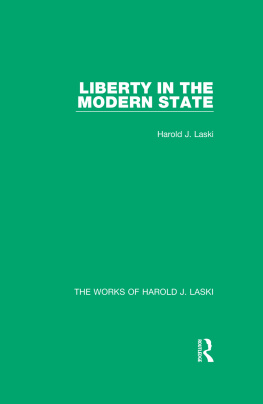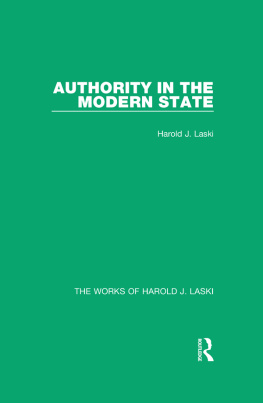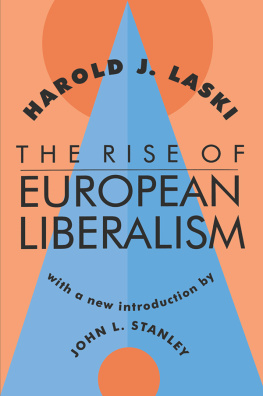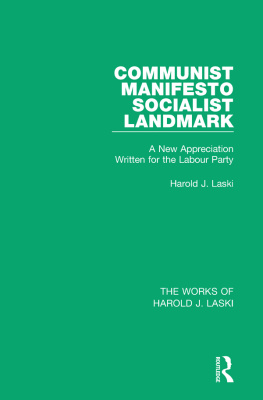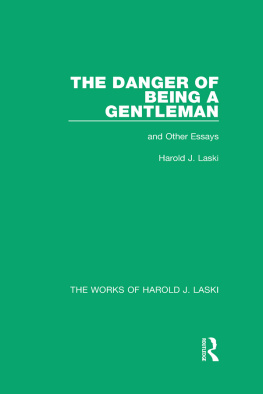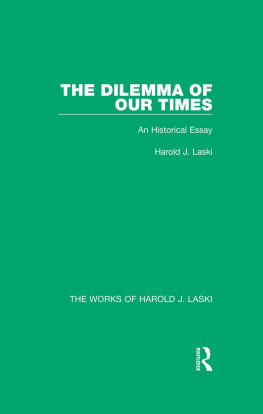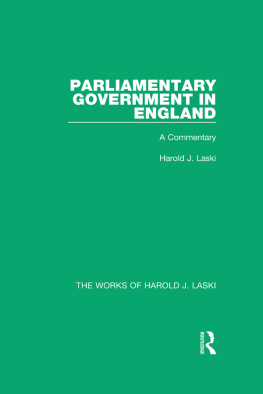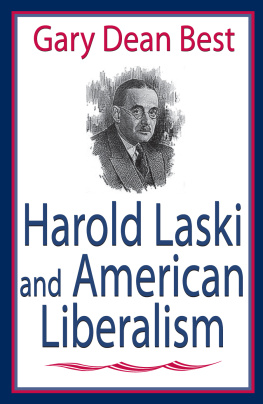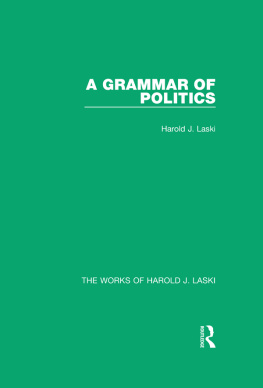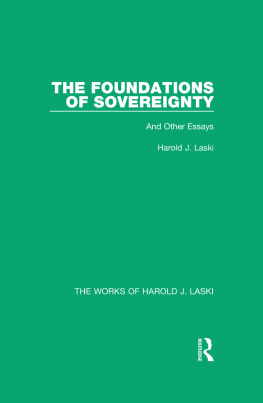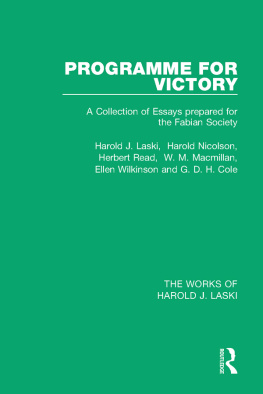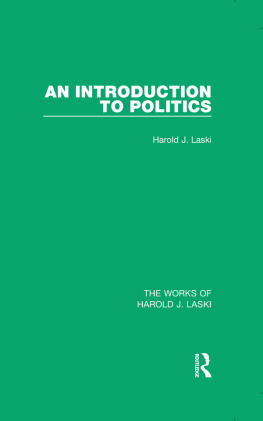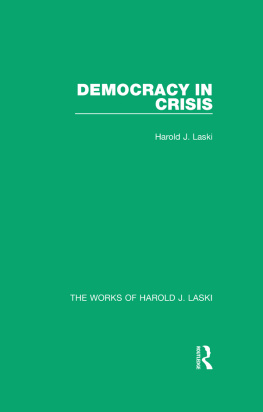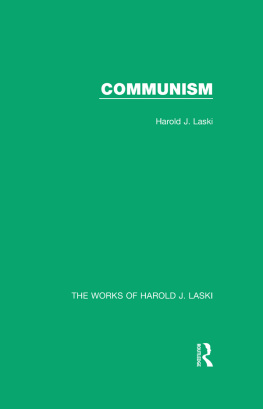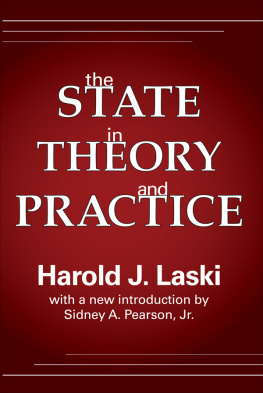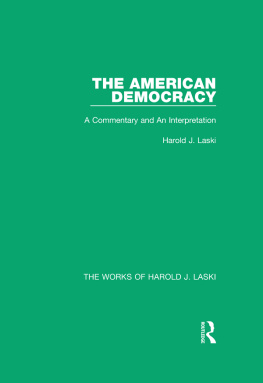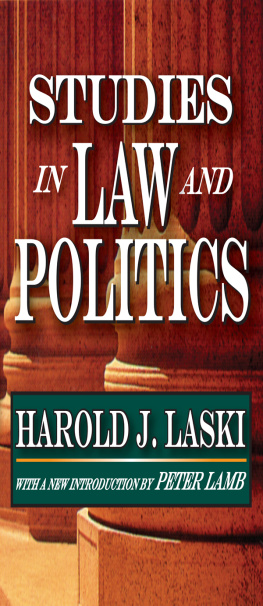THE WORKS OF HAROLD J. LASKI
Volume 12
LIBERTY IN THE MODERN STATE
LIBERTY IN THE MODERN STATE
HAROLD J. LASKI
First published in 1930 by George Allen & Unwin Ltd
This edition first published in 2015
by Routledge
2 Park Square, Milton Park, Abingdon, Oxon, OX14 4RN
and by Routledge
711 Third Avenue, New York, NY 10017
Routledge is an imprint of the Taylor & Francis Group, an informa business
1930, 1937, 1948 George Allen & Unwin Ltd
All rights reserved. No part of this book may be reprinted or reproduced or utilised in any form or by any electronic, mechanical, or other means, now known or hereafter invented, including photocopying and recording, or in any information storage or retrieval system, without permission in writing from the publishers.
Trademark notice: Product or corporate names may be trademarks or registered trademarks, and are used only for identification and explanation without intent to infringe.
British Library Cataloguing in Publication Data
A catalogue record for this book is available from the British Library
ISBN: 978-1-138-81912-2 (Set)
eISBN: 978-1-315-74273-1 (Set)
ISBN: 978-1-138-82316-7 (Volume12)
eISBN: 978-1-315-74219-9 (Volume12)
Publishers Note
The publisher has gone to great lengths to ensure the quality of this reprint but points out that some imperfections in the original copies may be apparent.
Disclaimer
The publisher has made every effort to trace copyright holders and would welcome correspondence from those they have been unable to trace.
HAROLD J. LASKI
LIBERTY IN THE MODERN STATE
NEW EDITION
First published in 1930
New edition .. 1937
New edition .. 1948
All rights reserved
Printed in the Netherlands
by HOLDERT & CO. N.V., AMSTERDAM
To Lon and Janot
who fought so nobly for liberty.
With deep affection and respect
31.8.47 H. J. L.
CONTENTS
In this new edition I have made very considerable changes both in the introduction and in the original text; after ten years so momentous as those since 1937, I hope that I have learned something which makes the perspective of the central principles in this book more fully adapted to the experience through which we have passed. In the reconstruction of the text, I should like to acknowledge how much I have learned from long discussions in war-time with my colleagues, Mr. H. L. Beales, Dr. W. A. Lewis, Dr. O. Kahn-Freund, and Mr. A. Radomsysler. I owe much, also, to my friend Professor Perry Miller, of Harvard University, whom the American Army was good enough to send to London so that, in the intervals of his military work, I could benefit by his imaginitive insight and his remarkable learning. I alone, of course, have the responsibility for the weaknesses of the book.
The dedication is to two of the bravest fighters for freedom it has been my good fortune to know. To have won their friendship is one of the great experiences of my life.
August 28th, 1947.
H. J. L.
The London School of Economics and Political Science.
IN the summer of 1929 I was invited to give the Colver lectures at Brown University; I was honoured by being able to accept. But my appointment, a few months later, as a member of the Lord Chancellors Committee on Delegated Legislation compelled me to withdraw from the post. I have thought, however, that the publication of the lectures (a condition of their delivery) might not be inopportune at the present time.
The book must speak for itself. Here I would only acknowledge the debt it owes to many of my friends, and specially to the late Mr. Justice Holmes, the late Professor L. T. Hobhouse, Mr. R. H. Tawney, and Professor (new Mr. Justice) Felix Frankfurter. It owes much, too, to my seminar at the London School of Economic and Political Science, the members of which have dissected it almost word by word. I need not say that none of these has any responsibility for the opinions I have expressed.
H. J. L.
Jan. 1st, 1930.
The London School of Economics and Political Science.
I
THIS book was written in 1930. When it was reprinted in 1937, I added to it an introduction in which I gave what seemed to me compelling reason for the view that the safeguards of liberty had visibly deteriorated all over the world. Since then, a second World War has been fought against the Fascist nations and their satellites. Alike in Europe and the Far East, it resulted in the unconditional surrender of the Fascists. Many of their most prominent leaders have been hanged or committed suicide; others have been sentenced to long terms of imprisonment. Out of the ashes of the League of Nations, there has arisen the United Nations Organisation, dedicated, like its predecessor, to the preservation of peace and the general improvement of mans lot in every land; this time, moreover, membership of the United Nations has been accepted, with all its obligations, by the United States of America, and by Soviet Russia, each of which has been given a seat on the vital executive body of the new institution the Security Council.
An immense victory has been won over those dark forces which, between the two world wars, everywhere threatened the survival of democracy and freedom. I do not, nevertheless, believe that any honest observer would truthfully say that the future of liberty is beyond all hazard. If we assume that the future of liberty depends upon the realisation of those Four Freedoms upon which President Roosevelt laid such eloquent emphasis, there is little reason to feel any certainty that the future of liberty is secure. Grave economic crisis over most of the world makes freedom from want an ideal that is bound to remain an empty one for long years to come. There can be no freedom from fear while international rivalry is so tense, above all when one, though only one, of the new weapons that may be used if that rivalry is allowed to drift to war, is the atomic bomb. If it is an exaggeration to say that there is less freedom of expression than there was between the War of 1914 and the War of 1939, it is certainly true to say that the status of free expression is in the danger zone still over very wide areas; in particular, the discovery of atomic fission, and of similar weapons of mass destruction, has struck a blow at free expression in what was once the international community of science from which there is very little prospect of its recovery unless and until there is a recovery of international security substantially different in quality from anything we have known since 1914. A good deal of the right to freedom of worship has been restored; but, apart from Moslem and Roman Catholic countries, this seems more the result of a declining interest in religion, a growth of what may be fairly called a nihilism in the realm of values, than of a positive attainment of a faith by which men of goodwill everywhere feel themselves to be bound.
The years of war, no less than the years in which, if there has not been peace, at least there has been a lull in the open conflict of states, has thrown a clear light upon the conditions in which alone liberty can be regarded as safe. Liberty needs an expanding economy as its primary condition; for where this obtains, men feel that they have hope, and hope is, perhaps, the most vital condition for the respect of law. Where a society has an expanding economy men feel a sense of spaciousness, the existence of opportunity, the chance of going forward. There is an atmosphere of exhilaration, a readiness for adventure, a conviction that private advancement is genuinely related to public welfare. Such a society has confidence in itself. It does not see threat in doubt, it is prepared to draw widely the boundaries of discussion.



